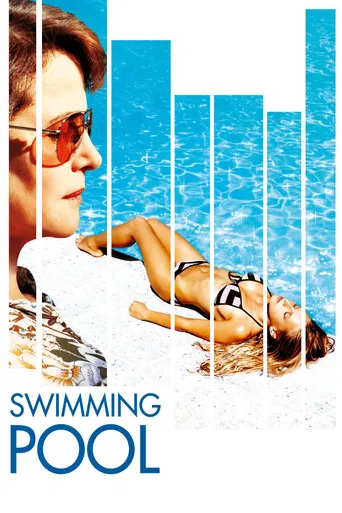

Before watching Swimming Pool I had in mind that I was going to watch a mystery thriller so in the end I was a bit disappointed because even though there is that vague mystery feeling floating during the movie it's only in the last twenty minutes that something is really happening and to me it could have come much sooner. The rest of the story was just too slow and not entertaining enough to me. Watching a grumpy Charlotte Rampling, like most of her roles, being jealous of a young nymphomaniac French girl is only good for about twenty minutes, after that I'm getting bored. The acting wasn't bad, but the story wasn't good enough to be remembered, at least not to me.
... View MoreThe plot in a giant SPOILER: A female London-based mystery novel writer spending a summer at her publisher's villa in France helps a young woman (Julie) claiming to be the publisher's daughter get rid of evidence of her murder of a local young man interested in both ladies. The writer ends up writing a book based on this girl and a book by her mother based on her romantic relationship with the publisher, and publishes it behind his back. The final sequence reveals another similarly named girl (Julia) to be the daughter of said publisher. The writer waves at both girls in the final scene, and the silhouette she waves at mimics her. Further SPOILERS: The first girl is topless through a lot of the movie, and BIG SPOILER: the older writer also goes Full Monty for one scene. No one else that matters gets naked.I immediately looked up interpretations of the film because it does not hold your hand in its conclusion. Julie's existence, her relationship with Julia, with the publisher, and with the writer all come into question. One character (if we accept he existed) grounds Julie in reality, it's the gardener Marcel. He has a dwarf daughter whom at the mention of her mother shuts herself in terrified, insisting she died in an accident. When he stumbles upon the freshly dug grave of Julie's latest victim, it is as if he had already seen this before. The writer looks at Julie for help, but since she's asleep, offers herself to the gardener instead. Julie is playful with Marcel, and in one scene stops him from working and pulls him in the bushes with her newly met sex partner. Julie might have had to gain the gardener' silence previously. Maybe she killed his wife. The hysteric way in which Julie pleads her mother not to leave her and her agony when she realizes she's talking to the author and her mother already isn't there could suggest she's reliving the past trauma of having been abandoned by her mother after a similar incident. Since the writer wouldn't have been there before, the gardener might have been Julie's former accomplice. Work at the villa might be compensation, it explains why neither parent wants to go back there or see Julie. Julia is younger than Julie, and could be the official family the publisher approves of. She has braces. Julie absolutely does not wear bras. She is too free, the unwanted child of a sex orgy. The book the writer publishes behind the publisher's back is an "illegitimate" product itself. It is more personal and vindictive. Etymologically, I don't know how much the director likes to play with names, but Julie's mother fled to somewhere Nice, her relationship with her father is Long done, and at the end she herself drives off to St Tropez, or Saint too much. When I first saw the writer seeing Julia for the first time, I thought Julie had duped her. The final scene might suggest the two are the same, but Julia does not seem to recognize the writer at all when they meet in London. Perhaps the writer is projecting one onto the other, but Julia is in London and wouldn't come without her father, Julie is gone to St Trop. The shadow she waves at happens to mimic the writer's wave, suggesting both are her puppets, imagination, or own projection. The movie ends leaving the silhouette anonymous. It also puts the writer back in France. Maybe the publisher gave her the villa as compensation. She did warn him her detective series would be coming back, a not so subtle blackmail after delivering him a book digging up old bones literally in his backyard. The best way to shut her up would be to give her a reason to keep people off the property he doesn't want to go back to himself. As soon as I finish writing this I'm sure I will come up with another interpretation, and I've already spent more than the movie's running time on this. This is perhaps the beauty of the Swimming Pool.
... View MoreThis plot is weak, without any twists. There is no acting involved with this movie, anyone willing to do nudity and smoke a lot could have been better for this role. I am not talking about the actors abilities, but the director was giving them the wrong direction and sent what was an okay script that, with a little editing, could have been a good movie, but instead he decided an actresses breast are more interesting than a plot. The direction is bad, he took on more of a porno/erotic thriller rather than a mystery. He was just plain bad and stupid he did not understand the script at all. This is a very bad movie, do not watch it, go watch just about any other movie, it will probably be better.
... View More(Spoilers!) This film is not for those who want everything spelled out for them, since it is open to many interpretations. I add mine here.The movie gave me some insight into how fiction writers create their work, since it delves into the things that spark an author's imagination. The writer in this movie is Sara Morton (Charlotte Rampling), a popular British author of crime fiction. When we first meet her, Sara is a bit burned out and when her publisher offers her his country house in the south of France as a temporary retreat to get her back on track, Sara accepts.We get to know some things about Sara as we see her settle into the house in France. She dresses rather plainly and is quite reserved. Even though she speaks French well, she is not very adventuresome, sticking close to the house with occasional visits to the local village. She seems to be immune to the French obsession with food, settling for fruit and yogurt. She hopes for a more intimate relation with her married publisher, John, and is disappointed when he reneges on coming to join her for a weekend on occasion. Nearing sixty, Sara seems sexually frustrated and very much alone.The movie moves into a different gear when Sara starts to conceive of a storyline for her next novel that involves an imagined visit from Julie, a fictitious version of John's daughter. For many reasons I think that there never was a real Julie. For one thing, when still in London in John's office, Sara asks him, "Would you come and visit me?," John answers, "Well, I have got my daughter." He didn't say, "I have got my younger daughter," or "I have got one of my daughters," but, "I have got my daughter." This indicated to me that John indeed had only one daughter. Sara never talks to John directly about Julie. When Julie is seen talking to her father and passes the phone to Sara, John is not on the line, and when Sara calls back, he is out of the office. If John's French daughter frequented his country home, wouldn't John tell her that Sara would be staying there? Also, the ending makes sense if there was never a Julie, since Sara's waving goodbye is seen as waving goodbye to her imagining of John's daughter for her fiction as well as her imagining of John's real daughter, whom we see at the end she has never met. Indeed I think John's comment, "I have got my daughter," was probably the initial spark for Sara's vision of an attempt at a novel.Most of what we see is Sara's conception of her novel. It is interesting how certain real events weave themselves into her fiction. Franck, the waiter at a local café becomes a character in the fiction, fantasized as one of Julie's lovers, but also fantasized by Sara as a lover for herself. Engaging to see how fiction writers may actually become involved with their imagined characters in a non-trivial way. Sara identifies with her imagining of Julie's mother to the point of wearing a dress she ascribes to her. Perhaps like actors, authors can temporarily take on the identity of their characters.Sara's fiction moves on as a rather unbelievable crime story that has Julie killing Franck and covering up the murder. At this point I think that Sara became disenchanted with what she was writing as being just another crime story; she had indicated earlier in the movie that she was tired of writing such stories. And this story seemed particularly uninspired and unbelievable (I think I have never seen a more artificial looking rock than the one Julie uses for the murder). I think that Sara, realizing the inanity of where her story was headed, then abandoned that whole effort in favor of writing the novel that Julie's mother supposedly had written. At one point Sara is sharing a meal with Julie and, after asking Julie a lot of questions, Julie remarks that Sara is showing a little too much interest in her life. Sara then says, "I am not so much interested in you as I am in your mother." I think that signaled the turning point when Sara started thinking about jettisoning the Julie story in favor of writing the romantic novel that Julie's mother supposedly had written.As to what Julie represented for Sara is anybody's guess I think. Was she an imagining of what Sara would like to have been as a young woman? Was Julie realized as part autobiography? What is real and what is imagined in a work of fiction seems to be a tricky thing. Perhaps a good deal of fiction is an expression of wish fulfillment on the part of the author.There are many elements in the movie whose interpretation is totally up for grabs. For example, what is the meaning of the egg that we see in several scenes that is constructed of several interlocking pieces? Is it a puzzle to be cracked, like this story? Is it the symbol of a new beginning for Sara? Or is it simply an ornamental knickknack? And what is the significance of the dark red inflatable mattress? How does the caretaker fit into the puzzle? Ozon and his screenwriter Emmanuèle Bernheim have presented the audience with a skeletal story that can be fleshed out in a multitude of ways.Whatever you think of the story, the movie is crisply filmed. We get a peek into what it might be like to live in a secluded area in southern France. Charlotte Rampling is in good form; it is a treat to see that she is getting good roles as she ages. Ludivine Sagnier is remarkably comfortable playing the voluptuous Julie and Charles Dance has a good turn as Sara's publisher. The score is suitably low key, but not without effect.
... View More